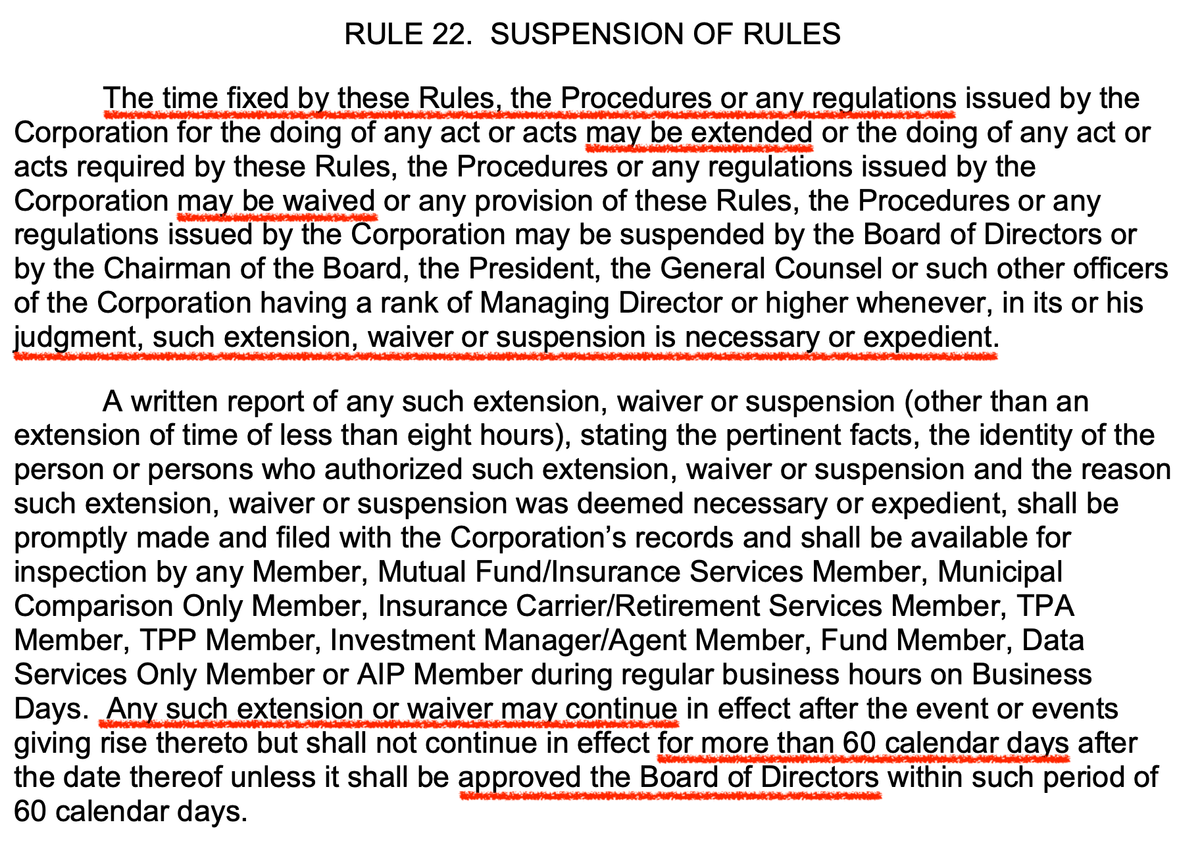From Nov 2015 through at least Mar 2023, Credit Suisse reported to the Trade Reporting & Compliance Engine (TRACE) approximately 9,000 late trades, and OVER 500,000! inaccurate TRACE reports. Punishment? Censure & $900,000 fine.

Source: https://www.finra.org/sites/default/files/fda_documents/2018060924101%20Credit%20Suisse%20Securities%20%28USA%29%20LLC%20CRD%20No.%20816%20AWC%20gg.pdf
OVERVIEW
- From November 2015 through at least March 2023, Credit Suisse reported to the Trade Reporting and Compliance Engine (TRACE) approximately 9,000 late trades, primarily in securitized products, and hundreds of thousands of inaccurate TRACE reports.
- The firm’s late and inaccurate TRACE reports violated FINRA Rules 6730 and 2010.
- From July 2016 through June 2021, Credit Suisse also failed to timely provide notice to FINRA for approximately 190 new issue offerings in TRACE-reportable securities in violation of FINRA Rules 6760 and 2010.
- Finally, Credit Suisse’s supervisory system for reviewing the timeliness and accuracy of its TRACE reporting was not reasonable. As a result, the firm violated FINRA Rules 3110 and 2010.
FACTS AND VIOLATIVE CONDUCT
FINRA Rule 6730 (Transaction Reporting) sets out the requirements that apply to firms when reporting transactions in TRACE-eligible securities. TRACE facilitates the mandatory reporting of over-the-counter transactions in certain fixed income securities and provides increased price transparency to market participants and investors.
- Untimely or inaccurate trade reporting of disseminated trades directly impacts investors and other market participants by depriving them of meaningful information necessary to make trading and valuation decisions.
- Inaccurate information affects the audit trail and can result in either false alerts or the inability to detect problematic transactions.
- FINRA Rule 6760 requires that members who are managing underwriters in TRACE eligible securities provide notice to FINRA of new issue offerings and do so within the timeframe prescribed in Rule 6760(c).
- Violations of FINRA Rules 6730 and 6760 also constitute a violation of FINRA Rule 2010, which states that “[a] member, in the conduct of its business, shall observe high standards of commercial honor and just and equitable principles of trade.” In addition, FINRA Rule 6730(f) provides that “[a] pattern or practice of late reporting without exceptional circumstances may be considered conduct inconsistent with high standards of commercial honor and just and equitable principles of trade, in violation of [FINRA] Rule 2010.”
Credit Suisse failed to timely report transactions in TRACE-eligible securities:

- Credit Suisse failed to timely report to TRACE transactions in securitized products, corporate debt, and agency debt securities. Most of these late reports, which ranged from a few minutes to several days late, had one of two root causes: (i) manual errors or omissions that delayed reports or (ii) amendments not submitted in a timely manner.
- Between January 2018 and September 2022, Credit Suisse failed to timely report to TRACE approximately 7,000 transactions in securitized products, an average monthly late reporting rate of 4.53%.
- From July 2021 through at least March 2023, Credit Suisse failed to timely report to TRACE approximately 1,800 transactions in corporate bonds, an average monthly late reporting rate of 2.61%.
- From January 2020 through March 2022, Credit Suisse failed to timely report to TRACE approximately 165 transactions in agency bonds, an average monthly late reporting rate of 19.6%.
Credit Suisse misapplied the No Remuneration indicator in TRACE reports:
- FINRA Rules 6730(d)(1) and 6730(d)(4)(F) require member firms to include the No Remuneration indicator where a trade report does not reflect either a commission, markup, or mark-down.
- The No Remuneration indicator provides investors and market participants more meaningful pricing information that better reflects comparable prices for principal and agency trades by identifying those trades where no commission, markup or mark-down was charged or known when reported.
- The No Remuneration indicator is part of publicly disseminated TRACE transaction data.
From May 2016 to July 2021, Credit Suisse submitted approximately 514,000 TRACE reports with inaccurate No Remuneration indicators for transactions in U.S. Treasury securities and securitized products.
- Due to coding errors, the inaccurate reports either failed to include the No Remuneration indicator or added the indicator when it did not apply.
- The error rate was approximately 19% of the firm’s total TRACE-reported trades in U.S. Treasury securities and securitized products.
- As a result of separate reviews in 2019 and 2021, the firm identified each coding error within 18 to 30 months after the violations began and remediated each error.
- Credit Suisse submitted two self-reports to FINRA disclosing its inaccurate use of the No Remuneration indicator.
Credit Suisse misapplied the Non-Member Affiliate – Principal Transaction indicator in TRACE reports:
FINRA Rule 6730(d)(4)(E) requires member firms to append a Non-Member Affiliate – Principal Transaction (NMAPT) indicator when reporting a transaction with a nonmember affiliate in which both the member and non-member affiliate act in a principal capacity and the trade occurs on the same day, at the same price, and in the same security as a transaction by the member with another contra-party.
- Application of the NMAPT indicator denotes a principal transaction with a non-member affiliate also acting as principal and removes a trade from public dissemination.
From July 2017 to February 2020, Credit Suisse reported to TRACE approximately 264,000 trades in U.S. Treasury securities and securitized products that, due to the firm’s coding error, inaccurately included the NMAPT indicator.
- The error rate was 15% of the firm’s total TRACE-reported trades in U.S. Treasury securities and securitized products.
- The firm identified the coding error 32 months after the violations began and remediated it. Credit Suisse self-reported to FINRA its inaccurate use of the NMAPT indicator.
Credit Suisse reported inaccurate information to TRACE:
- FINRA Rule 6730(c)(6) requires TRACE reports to identify the contra-party to the transaction. FINRA Rule 6730(c)(8) requires TRACE reports to contain the time of execution for the transaction.
- From November 2015 through June 2019, Credit Suisse reported to TRACE approximately 11,500 trade reports in corporate bonds with inaccurate contra-party identifiers.
- From July 2016 to December 10, 2021, Credit Suisse reported to TRACE approximately 9,700 trade reports in U.S. Treasury securities and securitized products with inaccurate execution times.
- The firm corrected the coding errors that caused these inaccurate reports and in two separate self-reports disclosed to FINRA its reporting of inaccurate execution times on certain U.S. Treasuries trade reports.
Credit Suisse failed to timely notify FINRA of new issue offerings:
- FINRA Rule 6760 requires that each member that is a managing underwriter of a new issue distribution or offering of a TRACE-eligible security provide notice to FINRA of certain information regarding the new issue prior to the execution of the first transaction of the offering, except as provided in the rule.
- From July 2016 through June 2021, Credit Suisse failed to timely notify FINRA of approximately 190 new issue offerings in TRACE-eligible asset-backed securities, an error rate exceeding 5% of the firm’s new issue submissions in TRACE-eligible asset backed securities.
Credit Suisse’s supervisory system was not reasonably designed to achieve compliance with TRACE reporting rules:
- From at least November 2015 through at least March 2023, Credit Suisse’s supervisory system concerning TRACE reporting was not reasonably designed to achieve compliance with FINRA Rules 6730 and 6760 for several reasons.
- First, Credit Suisse’s TRACE supervisory reviews identified a high number and percentage of late trade reports in securitized products by March 2018 and in corporate bonds by September 2021. Credit Suisse, however, did not fully address or remediate the underlying causes for the delayed reports, erroneous reports, and reports requiring subsequent amendments that resulted in the firm’s late reporting. Instead, the firm established internal late error rate targets for securitized products and corporate bond reporting that were too high to address its ongoing pattern of late trade reporting described above.
Second, Credit Suisse’s supervisory reviews for accuracy were unreasonable. For example:
- From as early as November 2014 to 2018, the firm primarily relied on rejected and mismatched trade notices from TRACE to identify inaccurate TRACE reports. By relying primarily on such notices in the firm’s supervisory reviews, the firm failed to capture certain other potentially inaccurate TRACE reports that were not part of TRACE reject and mismatch notices.
- In the second quarter of 2018, the firm added supervisory reviews for accuracy of certain TRACE fields, such as times of execution. The firm’s accuracy reviews, however, continued to exclude certain fields such as the No Remuneration indicator. During the third quarter of 2020, the firm implemented a supervisory review for the No Remuneration indicator.
- From at least November 2015 to 2020, two firm desks had not established any supervisory system or procedures to perform annual reviews to identify affiliates for TRACE reporting purposes, as required by FINRA Rule 6730 Supplementary Material .02. A third desk performed a review that was not reasonable because the review focused on past trades to determine the accuracy of the contra-party identifier rather than conducting a review to ensure that all entities met the definition of non-member affiliate, as the rule requires.
- Third, from July 2016 to June 2022, the firm did not have a supervisory system, including written supervisory procedures, to review the timeliness of notices it provided to FINRA of new issue offerings pursuant to FINRA Rule 6760.
Punishment?

Censure and $900k fine...
Naked short selling, can theoretically be facilitated by the kind of reporting failures that Credit Suisse has allowed to occur. Here's how the reported violations could contribute:
- Late and inaccurate reporting: Late and inaccurate TRACE reports can impair the transparency and integrity of the market. This can provide a cover for unscrupulous activities such as naked short selling, as it becomes more difficult for regulators and other market participants to accurately track and monitor securities transactions.
- Misuse of indicators: The misuse of "No Remuneration" and "Non-Member Affiliate – Principal Transaction" (NMAPT) indicators can obscure the true nature of transactions. The NMAPT indicator removes a trade from public dissemination, which could be misused to conceal improper transactions such as naked shorts.
- Inaccurate contra-party identifiers and execution times: Accurate reporting of contra-party identifiers and execution times are crucial for maintaining a clear audit trail of transactions. Reporting false identifiers or inaccurate execution times could potentially help obfuscate the true nature of a transaction, including concealing a naked short.
- Inadequate supervisory system: An effective supervision and compliance system is key to preventing and detecting fraudulent activities like naked short selling. Credit Suisse's failure to maintain an adequate system could create an environment where dishonest practices can more easily go unnoticed.
TLDRS:
- From Nov 2015 to Mar 2023, Credit Suisse reported around 9,000 late trades, mostly in securitized products, and hundreds of thousands of inaccurate reports to the Trade Reporting and Compliance Engine (TRACE). The late and inaccurate reports violated Financial Industry Regulatory Authority (FINRA) rules.
In essence, Credit Suisse messed up big time with their reporting, which directly impacts investors and other market participants by withholding crucial info needed for trading decisions.
- This includes instances where they misused key indicators in their reports, which would've provided more meaningful pricing information for participants.
- They also incorrectly reported transactions and misreported to TRACE about 11,500 trade reports in corporate bonds with inaccurate contra-party identifiers and around 9,700 trade reports with wrong execution times and from May 2016 to July 2021, Credit Suisse submitted approximately 514,000 TRACE reports with inaccurate No Remuneration indicators for transactions in U.S. Treasury securities and securitized products.
Furthermore, Credit Suisse dropped the ball on notifying FINRA about new issue offerings.
- Between Jul 2016 and Jun 2021, they failed to timely notify FINRA of about 190 new issue offerings in TRACE-eligible asset-backed securities.
Lastly, the firm’s supervisory system for reviewing TRACE reporting wasn't up to scratch, resulting in repeated errors and failures.
- Their reviews identified a high number of late trade reports but didn't fully address or fix the underlying issues.
- Their punishment for these violations? A $900k fine and censure.
- Naked short selling, can theoretically be facilitated by the kind of reporting failures that Credit Suisse has allowed to occur.



